- Home
- Nicholson Baker
A Box of Matches
A Box of Matches Read online
Acclaim for Nicholson Baker’s
A Box of Matches
“The sneaky, quiet power of A Box of Matches comes from the author’s ability to elevate simple moments … with precise observations that verge on poetry.”
—The Atlanta Journal-Constitution
“Like sitting in the dark, quietly watching a fire, A Box of Matches emits a placid, mesmerizing charm.”
—The Baltimore Sun
“Enthusiast, obsessive, visionary, engineer of the everyday—there’s nobody quite like Baker in the literary universe. … In A Box of Matches Baker dreams big: The meaning of his symbols is nothing less than the Meaning of Life.”
—Newsday
“Baker has crafted prose for [A Box of Matches] that would be the envy of any writer, his passages reminiscent of fine poetry. He evokes perfect images, beautiful images, precise images.”
—The Miami Herald
“Comical. … Chilling. … Baker’s range as a writer is indisputable. … An ideal book to read in the long dark hours of winter in front of a smoldering fire.”
—St. Louis Post-Dispatch
“Impossible to put down.”
—Men’s Journal
“[Baker’s] prose is so luminescent and so precise it manually recalibrates our brains.”
—Time
“Nicholson Baker is such a swell, smart writer.”
—Carolyn See, The Washington Post Book World
“This is a book to make you wonder at the miracle of every day life.”
—O Magazine
“Can the mundane be marvelous? It can, and it is, at least in the world of Nicholson Baker.”
—Minneapolis Star Tribune
“Baker captures bits of our world in ways that seem exact and true but have long eluded us.”
—The Oregonian
Nicholson Baker
A Box of Matches
Nicholson Baker was born in 1957 and attended the Eastman School of Music and Haverford College. He has published five previous novels—The Mezzanine (1988), Room Temperature (1990), Vox (1992), The Fermata (1994), and The Everlasting Story of Nory (1998)—and three works of non-fiction, U and I (1991), The Size of Thoughts (1996), and Double Fold (2001), which won a National Book Critics Circle Award. In 1999 he founded the American Newspaper Repository, a collection of nineteenth- and twentieth-century newspapers. He lives in Maine with his wife and two children.
Also by Nicholson Baker
The Mezzanine
Room Temperature
U and I
Vox
The Fermata
The Size of Thoughts
The Everlasting Story of Nory
Double Fold
For Margaret
1
Good morning, it’s January and it’s 4:17 a.m., and I’m going to sit here in the dark. I’m in the living room in my blue bathrobe, with an armchair pulled up to the fireplace. There isn’t much in the way of open flame at the moment because the underlayer of balled-up newspaper and paper-towel tubes has burned down and the wood hasn’t fully caught yet. So what I’m looking at is an orangey ember-cavern that resembles a monster’s sloppy mouth, filled with half-chewed, glowing bits of fire-meat. When it’s very dark like this you lose your sense of scale. Sometimes I think I’m steering a space-plane into a gigantic fissure in a dark and remote planet. The planet’s crust is beginning to break up, allowing an underground sea of lava to ooze out. Continents are tipping and foundering like melting icebergs, and I must fly in on my highly maneuverable rocket and save the colonists who are trapped there.
Last night my sleep was threatened by a toe-hole in my sock. I had known of the hole when I put the sock on in the morning—it was a white tube sock—but a hole seldom bothers me during the daytime. I can and do wear socks all day that have a monstrous rear-tear through which the entire heel projects like a dinner roll. But at night the edges of the hole come alive. I was reading my book of Robert Service poems last night around nine-thirty, when the hole’s edge began tickling and pestering the skin of the two toes that projected through. I tried to retract the toes and use them to catch some of the edge of the sock’s fabric, pulling it over the opening like a too-small blanket that has slid off the bed, but that didn’t work—it seldom does. I knew that later on, after midnight, I would wake up and feel the coolness of the sheet on those two exposed toes, which would trouble me, even though that same coolness wouldn’t trouble me if the entire foot was exposed. I would become wakeful as a result of the toe-hole, and I didn’t want that, because I was starting a new regime of getting up at four in the morning.
Fortunately last night I had an alternative. I’d brought a clean white tube sock to bed with me to use as a mask over my eyes, in case Claire was going to read late. I have to have darkness to go to sleep. I have one of my grandfather’s eye masks, made of thick black silk probably in the thirties, but it smells like my grandfather, or at least it smells like the inside of his bedside table. The good thing about draping a sock over your eyes is that it is temporary. The sock slips off your head when you move, but by then you’ve gone to sleep and it has served its purpose.
So when the hole in the sock on my foot became intolerable, I reached down and pulled it off in a clean, strong motion and flipped it across the room in the direction of the trash can—although I have to say there is something almost painfully incongruous in the sight of an article of underclothing that one has worn and warmed with one’s own body for many days and years, lying bunched in the trash. And then onto my naked foot I pulled the fresh sock that I’d had on my face. It felt so good: oh, man, it felt good, really good. I moved my newly sheathed foot back into the far region of the sheets and pulled the heavy blankets around me and I took my hand and curved it and draped it over my eyes where the sock had been, the way a cat does with its paw. Eventually Claire got into bed. I heard her bedside light click on and I heard the pages of her book shuffle, and then she twisted around so we could kiss good-night. “You’ve got your hand over your eyes,” she said. I murmured. Then she turned and shifted her warmly pajamaed bottom towards me and I steered through the night with my hand on her hip, and the next thing I knew it was four a.m. and time to get up and make a fire.
2
Good morning, it’s 3:57 a.m. and I’m chewing an apple. My name is Emmett, I’m forty-four, and I earn a living editing medical textbooks. I have a wife, Claire, and two children. When I made the fire in here yesterday, I clicked on a table lamp in order to see what I was doing. That was a mistake. You have to make the fire in the dark: it must become its own source of light. In fact you have to do as much in the dark as possible, including prepare the coffee, because when you turn on a light, your limbic system is hauled into the waking world, and you don’t want that.
So this morning I made the fire by feel. There was no moon, or else it was obscured by cloud, so I couldn’t even see where the fireplace was: it was just an empty hole of cold in the blackness. I bunched four balls of newspaper, and ripped up some of a pizza box and laid the ripped strips on them, and put some dried apple branches on top of that and some bigger logs higher up—really it’s like building a sandwich, except that the lettuce is at the bottom. I pulled off a match from the matchbook that was there where it should have been on the ashcan, feeling the negative thump when the cardboard fibers tore away, and I was on the verge of striking it, when I decided to wait. I wanted to see the fire catch and confirm itself, but I wanted to watch it while sipping my coffee. So I put the match down next to the matchbook and felt my way towards the kitchen. There was a very faint green circle of light on the floor of the dining room that I thought was a diverted reflection of a distant streetlight, but it turned out to be coming from the tiny green b
ulb in the smoke detector in the ceiling.
I opened the cabinet and felt for a curve of mug. I didn’t pull it from the shelf right away, since we sometimes pile mugs on top of mugs, tipping them slightly so that the top mug can rest there, and if I pulled a mug down without being careful, one of the upper-berth mugs might fall. But my octopuslike fingers found nothing nearby that was unstable, and so I took the mug down from the shelf. Which mug was it? I had no idea what color it was. I could feel the baked-on pattern under my fingers, but I couldn’t make out what it was. We have several mugs from railroad museums; I thought it might be one of them.
The sink was a pale shape, above which, presumably, were the taps and the faucet: I positioned the mug where I thought it would be under the faucet and filled it with some water and drank. You should always start your day with a drink of water. Then I made coffee, also by feel, and there was a sudden howl of light when I opened the refrigerator to pour some milk in my coffee; and then I came back in here and put the coffee down on the top of the ashcan. It was time to light the fire.
I felt for the single match that I’d laid out in readiness. It wasn’t there. I must have brushed it off when I was setting down the mug. No problem—I found the book of matches easily and opened it. Ah, but then my fingers felt nothing but cardboard stumps, like a row of children’s teeth just coming in. It had been the last match in the matchbook.
Well, I needed a match to start the fire. I went back into the dining room. Usually on the dining-room mantel there is a little Japanese bowl with a matchbook or two in it, because we have a fire in there when we have people over for dinner. I started at the right-hand side of the mantel and I made little finger-bunching motions—match-bowl, match-bowl? I came to a small glass object holding a squat low candle in it. The wick, because the candle had been used, was very straight and hard and the end of it crumbled a little when my finger touched it. A little ways farther down was a bowl that I thought was the one, but inside there were some dried things that must be rose petals—it felt like a bowl of Special K. I knew I’d gone too far down the mantel, so I worked my way back, proceeding carefully in case there was some trinket that I would make fall. I came to a semi-vertical curving shape and remembered that there was an old plate leaning there. I couldn’t visualize the pattern of this plate. Claire loves china but I can only keep in mind the china we use every day.
No, there were no matches that I could find on the dining-room mantel, and that meant I had to go back to the kitchen to see if there were any matches on the back of the stove. I should have thought of that right away. I groped delicately along the surface above the oven dials, past the cool facets of the salt and pepper shakers, and finally I came to a shape that moved easily when I touched it: the red box of wooden matches standing on its side.
I walked back to the living room and took a seat in the fire chair, and I pushed open the drawer of the matchbox, feeling both sides of the inner sliding tray when it emerged to be sure that I wouldn’t open it upside down and allow the matches to tumble plinkingly out, and I singled out one match and rolled its square shank between my fingers. When I struck it in the profundity of the dark I could see the dandelion head of little sparks shooting out from the match head and the eagerly waving arms of the new flame before it calmed down. The match flares more on the side away from where you slide it. Or am I wrong—is there more flare on the side that has touched the striking surface? I held the little flame to the scalloped hems of the balled-up newspaper lumps all along the front, and the fire worked its way in under the three logs, and soon I could feel its warmth on my shins.
3
Good morning, it’s 4:45 a.m., and today after I made the fire I just sat for ten minutes doing nothing. Every so often I yawned, leaning forward in my chair with my elbows on my knees and my hands clasped. Sometimes a yawn will take on a life of its own, becoming larger and more extensive than I could have foretold, forcing me to bow my head and gape until several drops of saliva, fed by streams on the insides of my cheeks, collect at the corners of my mouth and fall to the floor. After a few large down-yawns like these, my eyes are lubricated and I can think more clearly. I don’t know whether scientific studies of the human yawn have taken into account the way it helps to lubricate the eyeballs.
I do worry about the duck in the cold. She’s probably awake. We have a duck that lives in a doghouse outside. At night we drape a blanket over the doghouse and put a portable window screen over its front entrance. The screen is there to keep out foxes and coyotes. There is a red fox that lives on the hill with a bushy horizontal tail that is almost as big as he is, and at night sometimes you can hear the coyotes hooting from the fields on the other side of the river.
The duck’s blue dish freezes overnight. Every morning, before I leave for work (dropping Phoebe at school on the way), I hit the bowl upside down against a snow-pile and a disk of ice plops out: the bowl is self-cleaning in this weather. There are several other ice disks lying around in the snow, and these are pecked at by crows in the daytime. They look like UFOs, or maybe more like corneas—the layer of half-dissolved duck food frozen at the upturned bottom is the iris. The duck emerges, making her tiny rapid cheeps, excited over the prospect of the warm water, which steams when I pour it in the bowl. She makes long scoops of water with her under-beak and then straightens her neck to let the warmth slide down. I hold out a handful of feed, and she goes at it with her beak, very fast, with much faster movements than humans can make, moving like the typing ball on an old IBM Selectric. Some of the feed falls in the water, and that gets her crazy: she roots around in the swampy warmth, rapping at the bottom and finding all the nuggets that swirl there, making the water cloudy with the outflow from her throat. After a last burst of eating she looks up and is still, working her neck twice to settle her breakfast, and she walks out with me down the driveway. Sometimes here she will flap her wings hard, high-stepping in place without becoming airborne, like a jogger at a stoplight; sometimes she takes flight, although she hasn’t completely refined her landings. Her eyes are on the sides of her head: she has to turn away from me to look up at me, then out at the world, then up at me again.
Last night I was lying in bed when I heard a terribly sad sound, as of a cat in distress or an infant keening in the cold: long, slow, heart-rending cries. I half rose and held my breath and listened intently—was it the duck?—but the sound had stopped. I almost woke Claire to ask her what I should do. And then, as I resumed breathing, I realized that I was hearing a whistling coming from some minor obstruction in my own nose as I breathed.
At times, when I sit here, a long series of daytime thoughts will pass through me—thoughts connected with work or, say, with town politics. That’s all right—let those thoughts pass through you. You hear them coming, like a freight train with the whistle and the dinging; they take several minutes to go by, and then they’re gone. Remember that it’s very early in the morning—early, early, early, early. Sometimes the stars are thrillingly sharp when I first get up and stand at the window on the landing of the stairs: private needle-holes of exactitude in the stygian diorama. Orion’s belt is the only constellation that I recognize easily. The apportioning of stars into constellations is unnecessary: their anonymity enhances the sense of infinitude. This morning I saw a long pale mark like a scar across the heavens. It was the trail of a high jet, a night flight from somewhere to somewhere, lit from the underside by the setting moon. “A moonlit contrail,” I whispered to myself, and then I came downstairs and felt for the coffeemaker.
4
Good morning, it’s 4:52 a.m., and I’m very glad to be conscious when nobody else is conscious. To get to this point, where I am the sole node of wakefulness at the heart of the sleeping world, takes a fair amount of preparatory work. I have to get out of bed carefully, so as not to wake Claire, and I have to put on my bathrobe; I have to cinch snug the flannel sash and come downstairs by the front stairs, so as not to wake my son, whose bedroom is at the top of the bac
k stairs, and I have to make coffee.
Making coffee in the dark, especially when the moon has set, or when there is no moon, is a skill that improves with practice. First you pull out the old filter, with its layer of coffee sludge, and pin its sides together like a soft taco so that you can get it safely into the garbage can without spilling, and then you rinse out the filter basket and the carafe, taking special care to clean the little hole in the plastic top of the carafe, which is like the hole in the top of a baby’s head, where the coffee tinkles down from the basket and into the baby’s brain. And you stretch the fluted mass of paper filters so that your fingers can feel and take hold of one layer—a sensation similar to turning the pages of an eighteenth-century book—and you settle the filter in the basket so that none of its sides are likely to flop over, allowing the water to flow around the coffee without drawing out its liquor. When in darkness you scoop new coffee into the new filter, the danger is that the coffee will unbeknownst to you stay stuck in the scooper, and that you will think you are pouring in scoop after scoop when in fact nothing is going in. Today to be sure I poked my finger into the mound in the filter until I crunched bottom: I felt the coffee grains go past my first knuckle and a little way to the second—but I added another scoop to be sure.

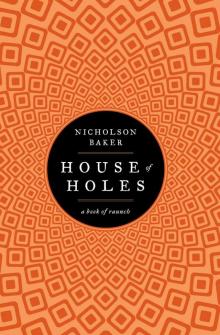 House of Holes
House of Holes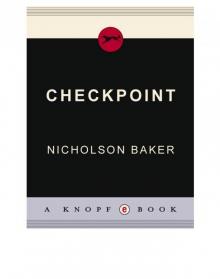 Checkpoint
Checkpoint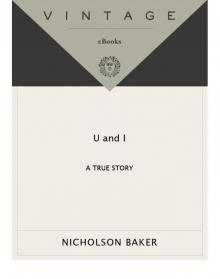 U and I
U and I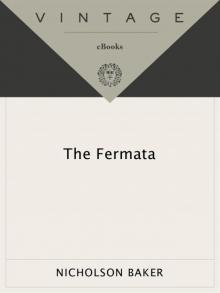 The Fermata
The Fermata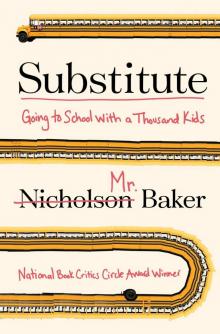 Substitute
Substitute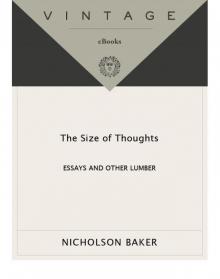 The Size of Thoughts
The Size of Thoughts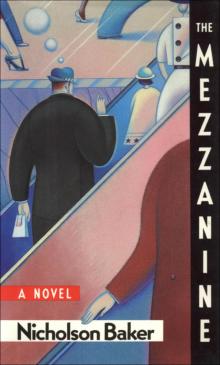 Mezzanine
Mezzanine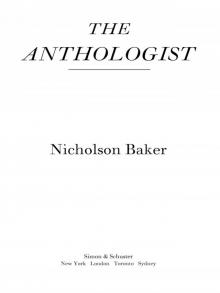 The Anthologist
The Anthologist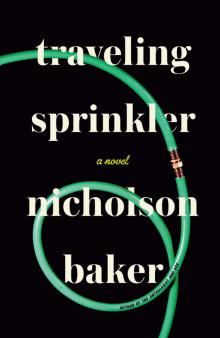 Traveling Sprinkler
Traveling Sprinkler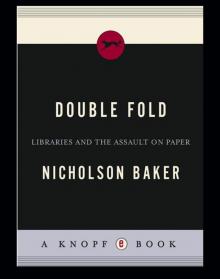 Double Fold
Double Fold The Everlasting Story of Nory
The Everlasting Story of Nory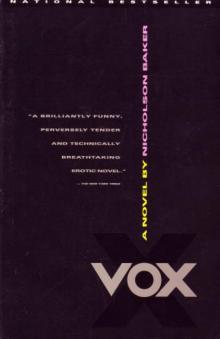 Vox
Vox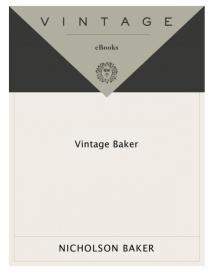 Vintage Baker
Vintage Baker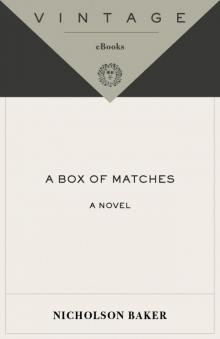 A Box of Matches
A Box of Matches